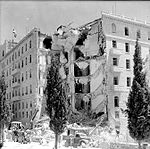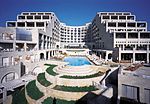King David Hotel

The King David Hotel (Hebrew: מלון המלך דוד, romanized: Malon ha-Melekh David; Arabic: فندق الملك داود) is a 5-star hotel in Jerusalem and a member of The Leading Hotels of the World. Opened in 1931, the hotel was built with locally quarried pink limestone and was founded by Ezra Mosseri, a wealthy Egyptian Jewish banker. It is located on King David Street in the centre of Jerusalem, overlooking the Old City and Mount Zion. It is named after David, a Biblical king. The hotel, owned and operated by the Dan Hotels group, has traditionally been the chosen venue for hosting heads of state, dignitaries, and other personalities during their visits to Jerusalem. It is also famous for having been targeted by a terrorist bombing in 1946 undertaken by the Zionist paramilitary group Irgun, in which 91 people died.
Excerpt from the Wikipedia article King David Hotel (License: CC BY-SA 3.0, Authors, Images).King David Hotel
King David Hotel, Jerusalem Talbiyeh
Geographical coordinates (GPS) Address External links Nearby Places Show on map
Geographical coordinates (GPS)
| Latitude | Longitude |
|---|---|
| N 31.774444444444 ° | E 35.2225 ° |
Address
מלון המלך דוד
King David Hotel
9410158 Jerusalem, Talbiyeh
Jerusalem District, Israel
Open on Google Maps











